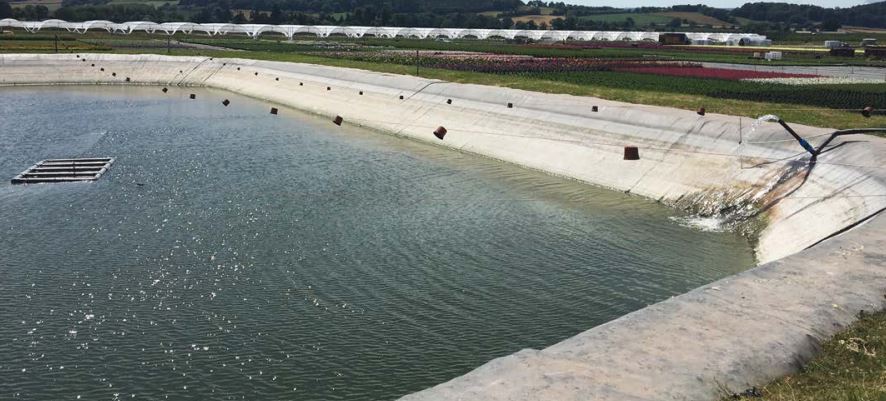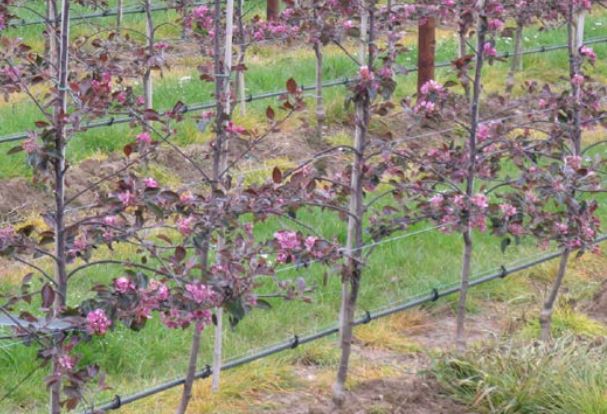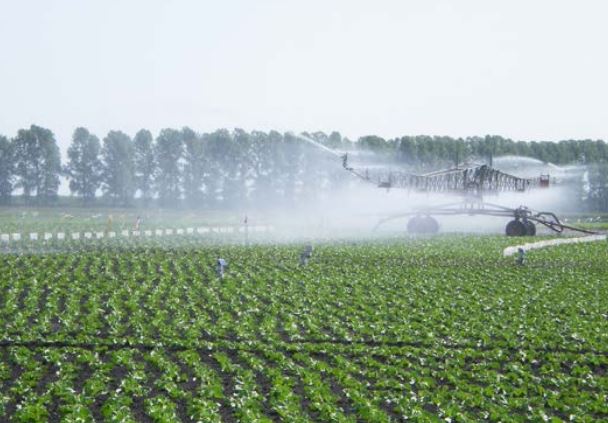Please click here to access the main AHDB website and other sectors.
- Home
- Knowledge library
- Establishing a resilient water supply
Establishing a resilient water supply
The quality and yield of horticultural crops depends on a consistent supply of water for irrigation. The factors to consider and the steps you should take to safeguard your water supply are set out here.
This information was last updated in 2019.
 AHDB
AHDB
Figure 1. Reservoirs can help to provide a resilient water supply throughout the irrigation season.
Action points for growers
-
Review the various water sources available to the business, taking account of future supply requirements
-
Undertake an analysis of the irrigation water used, at least annually, for chemical, physical and, if necessary, biological content
-
Audit current water usage, water harvesting/recycling potential, storage and application facilities and draw up an action plan to address recorded deficiencies
-
Develop mitigation plans to protect the business from interruptions to the water supply
-
Be prepared to negotiate the business mains water supply contract with water retailers
-
Check licences are appropriate, undertake new applications in a timely manner and explore the potential for licence trading
-
Become involved with local Initial Pilot Catchments or water abstractor groups.
Water needs for horticulture businesses
Access to reliable sources of water is critical for most horticultural businesses.
The majority use some form of irrigation, irrespective of their crop, to maximise yield and maintain quality.
Recent figures (2019) indicate that more than 50,000ha of land used for horticultural crops was irrigated with around 75 million m³ of water. See examples in Figures 2a and 2b.
 AHDB
AHDB
Figure 2a. Drip irrigation in an apple orchard.
 AHDB
AHDB
Figure 2b. Overhead boom irrigation in a field-grown brassica production.
Abstracted water
Even though this represents less than 1–2% of the total water abstracted in England and Wales, it is a consumptive use and concentrated in the drier catchment areas in the driest months.
A number of factors make good water supply management and planning crucial for your business:
- In some catchment areas, horticulture can be the largest abstractor during dry summers.
- Most horticultural businesses are located in catchment areas already defined as ‘having no more water available’ or classified as ‘over-licensed’ or ‘over-abstracted’.
- Changing rainfall patterns are also exacerbating the issue.
- Climate projections suggest that summer rainfall may decrease in key horticultural production areas.
- The chance of a summer as hot as the one experienced during 2018 has already increased to 10–20%, from less than 10%.
- There is increased pressure on water supplies from a growing population in the UK and sharper government focus on ensuring abstraction is environmentally sustainable.
It is therefore vital to secure a sustainable water supply for crop irrigation while protecting resources from over-abstraction and potential pollution.
Sources of irrigation water for horticulture
Water for irrigation can come from mains suppliers, from rainwater harvesting or collection and recycling of used water. Learn about the advantages and disadvantages of diffiernt types of water supply.
Water storage and management for horticulture
Reservoirs and tanks can greatly improve the water resilience of your business. Review the key points to consider when choosing between these two options.
Water licensing legislation for horticulture
Taking water from wells, boreholes and even reservoirs is regulated to make sure all users get a fair share and the environment does not suffer. Find out about the detail of England's water licensing and permit system.
Ensuring water supply resilience for horticulture
It is important to know how much water you need, and how you can get more if circumstances change. Learn more about water auditing, planning for unexpected supply interruptions and how to use abstraction licences efficiently and flexibly.
Useful links
AHDB resources on water
Water quality for the irrigation of ornamental crops
Water harvesting and recycling in soft fruit
Download the original PDF version of this factsheet
Licensing and permits
Water abstraction or impoundment license application (England)
Water abstraction or impoundment licence application (Wales)
Abstraction and impoundment licensing requirements (N Ireland)
Abstraction licensing strategies (CAMS process)
River flows
Water situation reports for England
How we manage Wales’ water resources
Rivers and lough levels (N Ireland)

